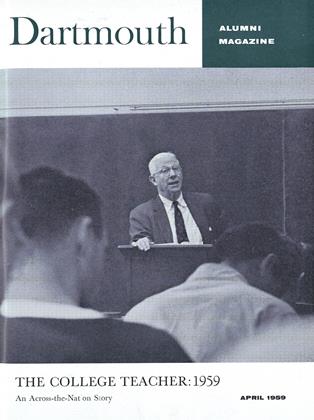By Charles G. Milham'06. Washington: Public Affairs Press, 1959.250 pp. $4.50.
A much more thorough account than the volume by Mercer published under the same title thirty years ago, this biography by the late Charles Milham '06 is the product of wide investigation and much careful research. It presents a detailed, interesting, and moving account of the brief career of Maj. John Pelham, commanding officer of Stuart's Horse Artillery of the Confederate Army. Young Pelham served less than two years in the War Between the States, but by the time of his death near Kelly's Ford, Virginia, in March 1863, although only twenty-four, he had won an undying fame among his countrymen and from Jeb Stuart himself the high accolade of "The Gallant Pelham."
John Pelham was born in northern Alabama in 1838. He grew into a tall, thin, ramrod-straight, handsome lad who even as the "boy major" was downy-cheeked and blushing. In July of 1856 he entered the U. S. Military Academy at West Point for what was then a five year course. Though he was an indifferent student, he was a very popular cadet and all went well until iB6O brought threats of secession. Cadet resignations were in order; and at long last, after the fall of Sumter and Lincoln's call for troops, Pelham and a friend heeded advice from home, submitted their resignations, and slipped silently into the night.
A Confederate commission of First Lieutenant of Artillery had already been issued to Pelham, and after a brief stop at Lynchburg he joined the Army of the Shenandoah near Harper's Ferry. In July he received his baptism of blood in the confusion of the First Manassas.
Late that year - perhaps, as the author suggests, through the good offices of Belle Boyd, the famous Confederate spy - he joined Jeb Stuart's cavalry outfit in what became the Army of Northern Virginia. Pelham served under Stuart in most of the actions on this northern front, distinguishing himself particularly at the Seven Days battles and at Fredericksburg - the latter, according to Milham, having made Pelham "probably the best-known artillerist in Lee's Army." In urging his promotion, Stuart wrote, "In either cavalry or artillery no field grade is too high for his merit and capacity." But it was only a few months later that a shell splinter entered the back of young Pelham's head and within a few hours he was dead.
This book was written about twenty-five years ago, but its delayed but timely publication at this time gives it a place in the flood of Civil War centenary literature; and, appropriately, it has an introduction by U. S. Grant, 3rd, Chairman of the U. S. Civil War Centennial Commission. The manuscript of this volume came to the attention of Douglas S. Freeman, before his death in 1953, and the great authority on Lee expressed strong approval of its "sound scholarship and literary skill." Readers of Benét's John Brown'sBody who are curious about his reference to "that quiet boy with the veteran mouth," who was "to fight sixty battles and never lose a gun," will now find in Charles Milham's volume all the facts about Pelham they might want, and a very good story to boot.
 View Full Issue
View Full Issue
More From This Issue
ALLEN R. FOLEY '20
-
 Books
BooksA HISTORY OF LUMBERING IN MAINE, 1820-1861.
December 1935 By Allen R. Foley '20 -
 Article
ArticleTHE GENUS EMERITUS
January 1962 By ALLEN R. FOLEY '20 -
 Books
BooksAMERICAN FEMINISTS.
NOVEMBER 1963 By ALLEN R. FOLEY '20 -
 Article
ArticleHANOVER UNDER COVER
FEBRUARY 1964 By ALLEN R. FOLEY '20 -
 Article
ArticleON RETIREMENT
JUNE 1964 By ALLEN R. FOLEY '20 -
 Article
ArticleONCE AGAIN ACROSS THE RIVER
FEBRUARY 1965 By ALLEN R. FOLEY '20
Books
-
 Books
BooksALUMNI PUBLICATIONS
April 1917 -
 Books
BooksFITZ HUGH LANE.
MARCH 1973 By ALEXANDER LAING '25 -
 Books
BooksINSIDE TENNIS: TECHNIQUES OF WINNING.
OCTOBER 1969 By CARLTON PENNINGTON FROST '18 -
 Books
BooksTHE MANUAL OF CORPORATE GIVING
November 1952 By FORD H. WHELDEN '25 -
 Books
BooksTHE EUROPEAN ANCESTRY OF VILLON'S SATIRICAL TESTAMENTS
February 1942 By Leon Verriest -
 Books
BooksMAKE YOUR OWN MOVIES. (FOR FUN AND PROFIT).
June 1939 By S. C. H.







